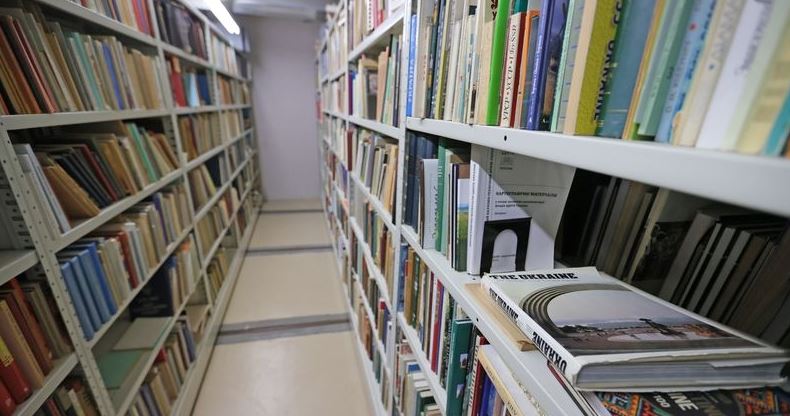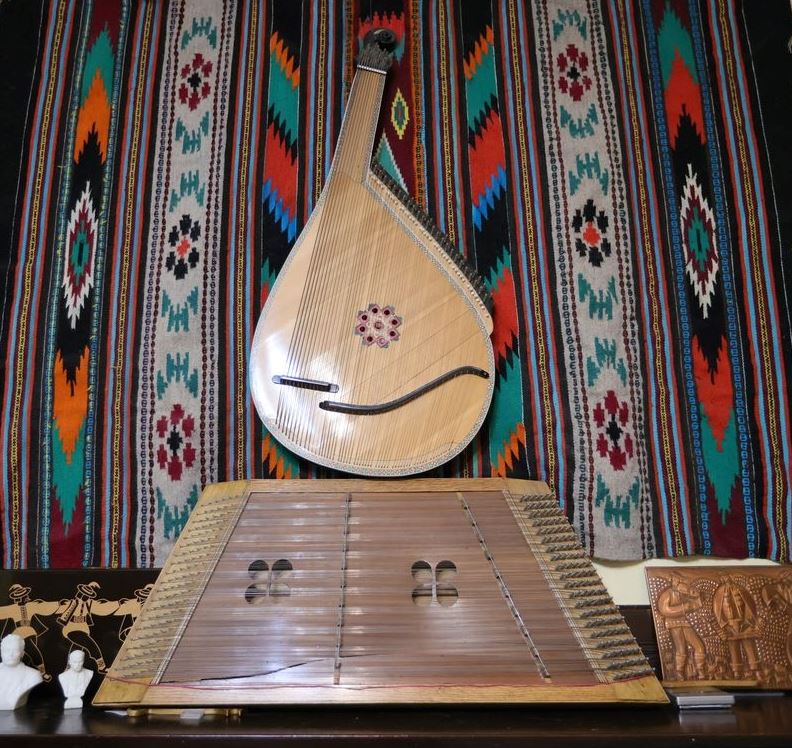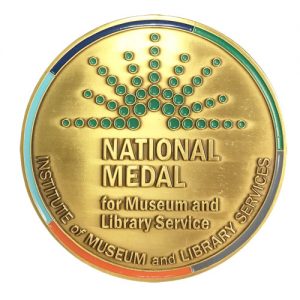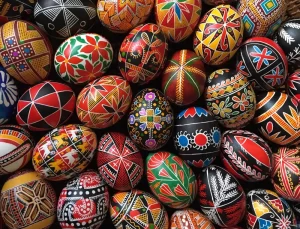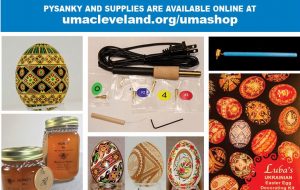The Ukrainian Museum-Archives in Cleveland was founded in 1952 by displaced scholars who took on the mission of collecting and preserving items from Ukrainian history and culture during an era when this kind of material was being deliberately destroyed in Soviet Ukraine. Over the course of its first quarter century, the UMA compiled a huge collection that includes many rare, even unique items.
The UMA has been located in Cleveland’s Tremont neighborhood throughout its entire existence. In the late 1970s, and throughout most of the ’80s, the UMA mirrored the neglect of the Tremont neighborhood. Starting in the early 1990s, the institution and the neighborhood began to experience renewal and growth.
A second generation of Ukrainian-Americans assumed responsibility for the UMA in the late 1980s and have continued to maintain and enhance the collection. We developed exhibits and hold regular events, both free-standing and in cooperation with the neighborhood. Much of the work is done by volunteers.
In 1991, with the break-up of the Soviet Union and the independence of Ukraine, the UMA’s collection began to attract attention from other institutions, including the Library of Congress, the Cleveland Museum of Natural History, Ohio State University’s Slavic Studies Department and the Academy of Sciences of Ukraine. In 1998, the Government of Ukraine requested that the UMA prepare a Pilot Project that has been incorporated into the U.S.-Ukraine Agreement on the Protection and Preservation of Cultural Heritage. Within the framework of the Bilateral Agreement, the UMA, Ohio State University and Cleveland State University are collaborating on a course, Introduction to Ukrainian History and Culture.
All of these developments are complemented by the on-going improvement of the Tremont neighborhood. The UMA is working with the Tremont West Development Corporation locally, with Ohio State University on a state-wide level, with the U.S. Department of State and the U.S. Congress nationally and the Academy of Sciences of Ukraine internationally. This requires us to accept the dual challenge of contributing both to the development of the Tremont neighborhood, which is our home, and to the growing interest in Ukraine as a cultural, scholarly and geopolitical factor, which is our mission.
Our Sponsors
The UMA is grateful for our the support that we receive from local and national grantmakers.
Because of COVID, the UMA had to cancel our annual Easter Bazaar in March 2020 and our annual Kulala Summer Solstice Fest in June 202, resulting in an approximately $40,000 loss in operating funds. Although the UMA remained closed for a substantial period of time due to the global pandemic, we continued to expend costs to maintain environmental conditions to protect our collection, and for staff to oversee and respond remotely to requests for information, research materials, etc. We also carefully re-opened our summer intern program (with proper social distancing) for young people interested in Ukrainian culture and history.
We are grateful for the ongoing support of Cuyahoga Arts & Culture and the Ohio Humanities Council for its Ohio Cares grant which we received during the COVID crisis.
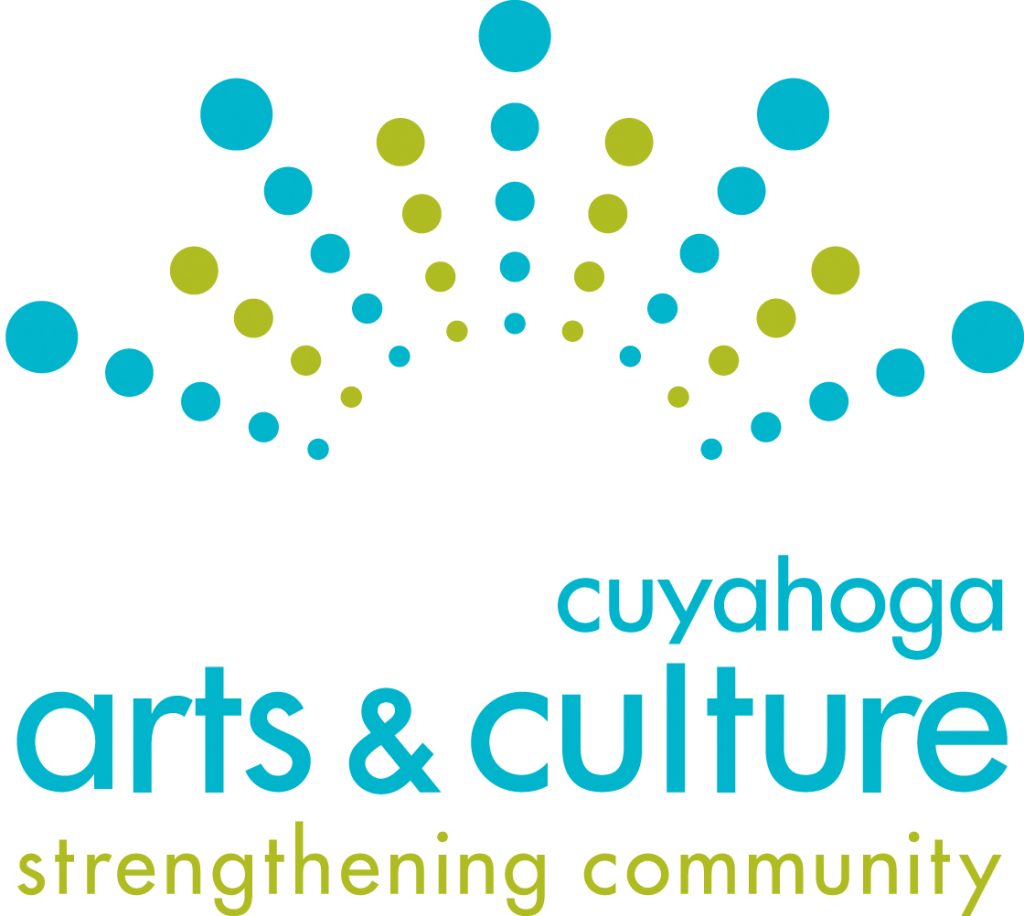
We are grateful for the ongoing support of Cuyahoga Arts & Culture and the Ohio Humanities Council for its Ohio Cares grant which we received during the Covid 19 crisis.
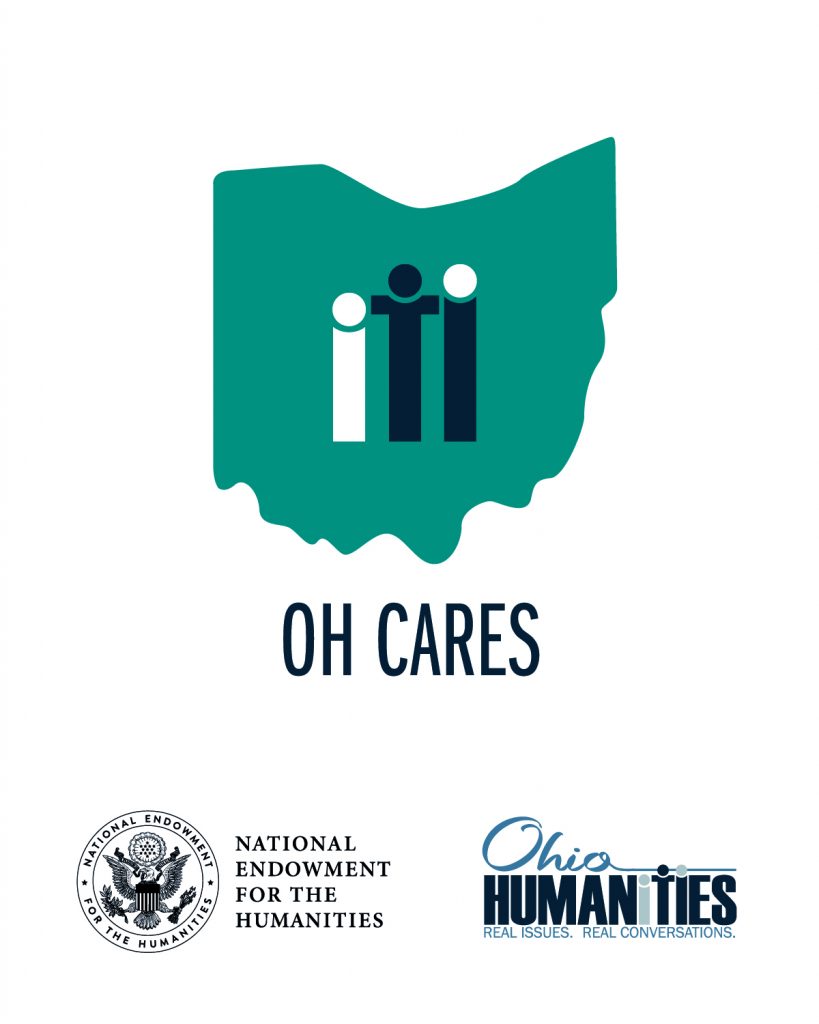
Recognizing the financial challenges Ohio cultural institutions faced during COVID, the Ohio Humanities Council (OHC) created the OH CARES program and invited the Ukrainian Museum-Archives (UMA) to apply for a grant to offset losses in revenue. In late, June OHC awarded the UMA a $10,000 CARES grant. The OHC grant helps the UMA to partially offset the loss of revenue the COVID counter-measures forced on us. We are grateful to the staff at OHC who have been so helpful, friendly and accommodating. Thank you!
The UMA is a recipient of a Google Grants program award, which supports organizations sharing Google’s philosophy of community service to help the world in areas such as science and technology, education, global public health, the environment, youth advocacy, and the arts.
Designed for 501(c)(3) non-profit organizations, Google Grants is a unique in-kind advertising program harnessing the power of Google AdWords advertising product. Google Grants has awarded AdWords advertising to hundreds of non-profit groups whose missions range from animal welfare to literacy, from supporting homeless children to promoting HIV education.
We are also very grateful for the continued support of:
- Ohio Humanities Council
- Antonovych Foundation Grant
- Heritage Foundation of First Security Federal Savings Bank
- State of Ohio
- City of Cleveland
- Cleveland Selfreliance Federal Credit Union
- U.S. Department of Housing and Urban Development (past sponsor)
Board of Directors
- Andrew Fedynsky, Director
- Taras Mahlay , M.D., President
- Kristina Kvartsyana, Chair, Outreach and Education, Secretary
- Natalie M. Strouse, CPA, Treasurer
- Nancy Stecyk, Chair, Collections Committee
- Michael Dobronos, Esq.
- George Jaskiw, M.D.
- Petro Lawriw
- James Reddy
- Petro Teluk, Esq.
Staff
- Paul Burlij, Executive Director
- Aniza Kraus, Curator, aniza@umacleveland.org
- Ulyana Woznak, Office Manager, staff@umacleveland.org
- Walter Ciszkewycz, Preservation Technician
- Tetiana Zhaldak, Merchandise Manager, giftshop@umacleveland.org
Advisors
- Dr. Natalie Kononenko
- Ihor Kowalysko
- Marta Mudri
- Janis Purdy
UMA Interns
Nicholas Suprenenko, a Cleveland resident and UMA supporter, was dedicated to furthering Ukrainian culture and scholarship and recognized that its future depended on young people. That is why, as his legacy, he established a summer intern program at the UMA. Each year the UMA hires interns to catalogue, scan materials, and assist in research projects.
We welcome donations to continue funding the summer intern program. Please contact us so that we can help you make a donation to the fund.
UMA Interns since 2005:
- Lydia Apostoluk – Vanderbilt University
- Stefan Apostoluk – University of Cincinnati
- Roksolana Balukh – University of Toledo
- Erica Boyko – Ohio University
- Sofia Dobronos – The Ohio State University
- Alexandra Fedynsky – University of Notre Dame
- Michael Fedynsky – University of Notre Dame
- Paul Fedynsky – St. Mary’s College of Maryland
- Alexandra Holowatyj – St. Mary’s College, University of Notre Dame
- Oleh Holowatyj – Chesterland Culinary School
- Roman Jakubowycz – Miami University of Ohio
- Daniel Jarosewich – Walsh Jesuit High School
- Nicholas Jarosewich – Miami University of Ohio
- Timothy Jarosewich – Walsh Jesuit High School
- Ann Jaskiw – Brown University
- Michael Jaskiw – Harvard University
- Terry Kaiser – The Ohio State University
- Seamus Kelleher – The Ohio State University
- Stephanie Kindrat – University of Findlay, Boston University
- Bohdana Komichak – Ohio University
- Larissa Kopystynsky – Loyola University of Chicago
- Maksym Kostryk – Miami University of Ohio
- Lukash Kowcz – Kent State University
- Christina Logvynyuk – St. Joseph Academy
- Adrian Laluk – Fordham University
- Alexander Laluk – Gannon College
- Andrew Lisowsky- The Ohio State University
- Julianna Lisowsky- Miami University
- Lydia Lisowsky- Kent State University
- Andrew Mahlay- The Ohio State University
- Orest Mahlay- George Washington University
- Oksana Mahlay-Pasakas – The Ohio State University
- Andriy Mironovich – University of Notre Dame
- Leo Mironovich – University of Notre Dame
- Melanie Mironovich – University of Notre Dame
- Kathleen Murphy – Marquette University
- Nadiya Petriv – The Ohio State University
- Nestor Semenyuk – Miami University of Ohio
- Pavlo Stasiouk – Miami University of Ohio
- Catherine Stecyk – University of Notre Dame
- Michael Stecyk – University of Notre Dame
- Larissa Strouse – DePaul University
- Yuliya Tvardovska – Lehigh University
- Yuliya Vanchosovych – The Ohio State University
- Lesya Zappernick- Ohio University
- Andriy Zborovsky – Hinckley High School
- Bohdana Zborovska – University of Cincinnati
- Solomiya Zborovska – The Ohio State University
Annual Reports
- Ukrainian Museum-Archives Annual Report 2022
- Ukrainian Museum-Archives Annual Report 2021
- Ukrainian Museum-Archives Annual Report 2020
- Ukrainian Museum-Archives Annual Report 2019
- Ukrainian Museum-Archives Annual Report 2018
- Ukrainian Museum-Archives Annual Report 2017
- Ukrainian Museum-Archives Annual Report 2016
- Ukrainian Museum-Archives Annual Report 2015
- Ukrainian Museum-Archives Annual Report 2014
- Ukrainian Museum-Archives Annual Report 2013
- Ukrainian Museum-Archives Annual Report 2012
- Ukrainian Museum-Archives Annual Report 2011
- Ukrainian Museum-Archives Annual Report 2010
